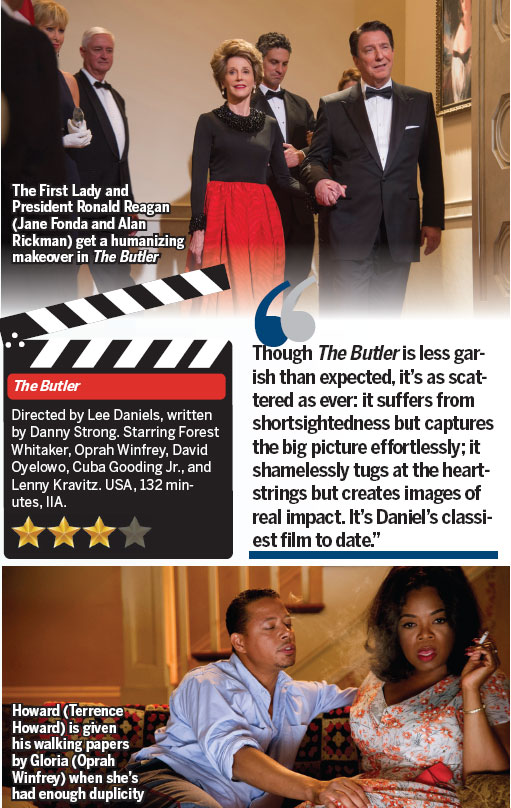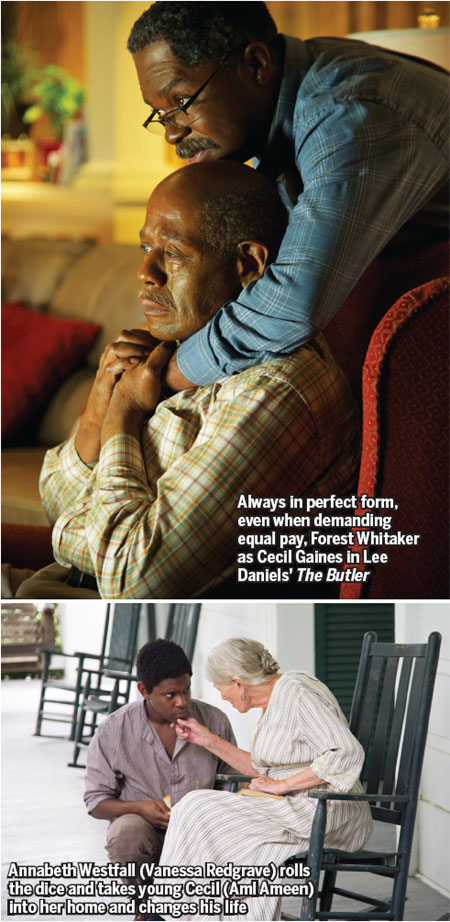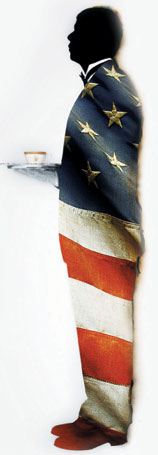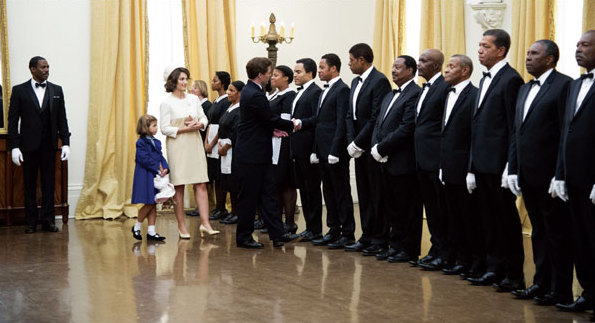In service of civility
Updated: 2014-01-10 06:49
By Elizabeth Kerr(HK Edition)
|
|||||||
Lee Daniels brings his grandiose touch to American history in his most polished film yet. Elizabeth Kerr reports.
Lee Daniels is not a very good filmmaker. That's not to say his films (three of four so far) aren't enjoyable, he's just something of a hack-one that has a taste for the lurid and all things gothic. If ever there was a director of the people for the people, it could be Daniels. He has none of the highbrow polish of the Coens, the urban realism of Scorsese, the sensuality of Polanski or the sweep of Malick. But he doesn't need it. Daniels has a unique ability to wallow in our collective sordid side and still find drama worth exploring. To Daniels, they're one in the same.
Daniels' first feature as director,Shadowboxer, was about a terminally ill assassin on one last job-the murder of a pregnant woman-with her lover/stepson. He followed that lunacy withPrecious, his one misfire (though I'm in the minority), a grim and needlessly sensational story of an abused, obese, HIV-positive inner-city teen that heaped one horror upon another on the lead character. Rather than inspiring outrage, it inspired the desire for a shower. Next up was the grimy slice of sweaty southern gothic that wasThe Paperboy, the guiltiest pleasure of 2012. Through all this squalor, Daniels got sparkling performances from heavy hitters like Helen Mirren, Nicole Kidman, Gabourey Sidibe, John Cusack, Matthew McConaughey, Joseph Gordon-Levitt and Mariah Carey (!).


|
Carter Wilson (Cuba Gooding Jr) and James Holloway (Lenny Kravitz) are part of the silent army of service staff that make the White House run. |
Regardless of Daniels' penchant for the lurid, actors love him and he does have an eye for the little ironies and unspoken rules of contemporary human relations; his observations, while buried under layers of grotesquerie, are pithy. In his latest, the Oscar-baitingThe Butler, those observations come fast and furious-one sharp comment for every moment that's overblown and maudlin. One rich snapshot of African-American lives in flux followed immediately by a dollop of facile sentimentality (oh, the strings on the soundtrack).
The Butleris something of the anti-Lincoln, in that rather than focusing on one specific moment in American history, it serves as a 20th century presidential greatest hits. That's to be expected as the film is loosely based on the true story of Cecil Gaines (the always dignified Forest Whitaker) and his struggle to reconcile his place in a world that devalues him with working in its halls of power. A career behind enemy lines as it were. As is often the case with films that span decades, Daniels and writer Danny Strong are compelled to jettison much of what doesn't directly impact Cecil, for better and worse.
A prologue introduces us to 8-year-old Cecil, growing up on a cotton plantation in the early 1900s. After the farm's vicious owner (Alex Pettyfer,Magic Mike) murders his father, matriarch Annabeth Westfall (Vanessa Redgrave) takes him into the house and trains him in service. Years later the itinerant Cecil is on the streets "up north"-hungry, homeless, jobless-when he's taken under wing by Maynard (icon Clarence Williams III,The Mod Squad) to work in a swish Washington DC hotel. Cecil's next stop is the White House, where he serves under presidents from Dwight Eisenhower to Ronald Reagan. The film's first zinger comes at Cecil's job interview, where chief of domestic staff Freddie Fallows (Colman Domingo) intones, "We have no tolerance for politics at the White House, Mr Gaines."

The bulk of the film takes place between the Eisenhower years following the landmark Brown vs Board of Education decision that would lead to desegregation of public schools, and the rise of JFK and the modern civil rights movement. Daniels makes sure all the boxes are ticked-Martin Luther King, Vietnam,Watergate-but those events serve only as a backdrop to the events unfolding in the Gaines home. Cecil's marriage has its ups and down, as his wife Gloria (Oprah Winfrey, serviceable but not remarkable) wrestles with alcoholism, infidelity and comes to resent his job.
The real story is in how Cecil and his eldest son, Louis (David Oyelowo), react to Cecil's ever-changing bosses. Louis' increasing activism and eventual militancy drive a wedge between the two men. Louis can't see how his father can go to work everyday and remain indifferent; Cecil can't understand how Louis can't appreciate what it took for Cecil to provide a university education for his kids. This is where Daniels really captures the dynamics and thorny socio-political waters that are being treaded even today. In an awkward dinner sequence, Cecil and Gloria refer to actor Sidney Poitier as a beacon of progress. To Louis and his Black Panther acolyte girlfriend, Carol (one-timeNext Top ModelYaya Alafia), he's an Uncle Tom. Daniels and Strong deftly walk the tightrope between both arguments.
The core cast keepsThe Butleron track. In addition to Oyelowo, who's nicely nuanced as a young man finding his political voice, Lenny Kravitz and Cuba Gooding Jr (nice to see him actually acting for a change) as Cecil's colleagues James Holloway and Carter Wilson bring a wise, carefully modulated humanity to their roles, and serve as stand-ins for the many staff there's no time to get to know. Gooding demonstrates someofthe same weary charm that won him an Oscar all those years ago, and together they form the emotional backbone of the film. There's a movie in just these three guys.
As mentioned, stars love Daniels, and so there's a good game of "Spot the A-lister" as crucial historical figures going on inThe Butler. Some are bland (James Marsden as JFK), some barely register (John Ehrlichman made an appearance?), Gerald Ford and Jimmy Carter get shafted. But Liev Schreiber's 8 glorious minutes as Lyndon Johnson and Alan Rickman and Jane Fonda (now, there's irony) as the Reagans leave an impression, if only for image rehabilitation (depending on your politics).
ThoughThe Butleris less garish than expected, it's as scattered as ever: it suffers from shortsightedness (the 1970s gets stock treatment) but captures the big picture effortlessly (it takes Cecil his entire career to achieve wage equity); it shamelessly tugs at the heartstrings (Cecil and Louis' reconciliation) but creates images of real impact (a lit cross on an empty road). It's Daniel's classiest film to date, but it must be said: I kind of miss his trashy side.
The Butleropens in Hong Kong on January 16.
(HK Edition 01/10/2014 page7)
